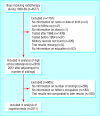Effect of low doses of ionising radiation in infancy on cognitive function in adulthood: Swedish population based cohort study
- PMID: 14703539
- PMCID: PMC313898
- DOI: 10.1136/bmj.328.7430.19
Effect of low doses of ionising radiation in infancy on cognitive function in adulthood: Swedish population based cohort study
Abstract
Objective: To determine whether exposure to low doses of ionising radiation in infancy affects cognitive function in adulthood.
Design: Population based cohort study.
Setting: Sweden.
Participants: 3094 men who had received radiation for cutaneous haemangioma before age 18 months during 1930-59.
Main outcome measures: Radiation dose to frontal and posterior parts of the brain, and association between dose and intellectual capacity at age 18 or 19 years based on cognitive tests (learning ability, logical reasoning, spatial recognition) and high school attendance.
Results: The proportion of boys who attended high school decreased with increasing doses of radiation to both the frontal and the posterior parts of the brain from about 32% among those not exposed to around 17% in those who received > 250 mGy. For the frontal dose, the multivariate odds ratio was 0.47 (95% confidence interval 0.26 to 0.85, P for trend 0.0003) and for the posterior dose it was 0.59 (0.23 to 1.47, 0.0005). A negative dose-response relation was also evident for the three cognitive tests for learning ability and logical reasoning but not for the test of spatial recognition.
Conclusions: Low doses of ionising radiation to the brain in infancy influence cognitive abilities in adulthood.
Comment in
-
Ionising radiation in infancy and adult cognitive function: protocols for computed tomography must be optimised.BMJ. 2004 Mar 6;328(7439):581; author reply 582. doi: 10.1136/bmj.328.7439.581-a. BMJ. 2004. PMID: 15001512 Free PMC article. No abstract available.
-
Ionising radiation in infancy and adult cognitive function: radiation may not solely explain later cognitive function.BMJ. 2004 Mar 6;328(7439):581-2; author reply 582. doi: 10.1136/bmj.328.7439.581-b. BMJ. 2004. PMID: 15001513 Free PMC article. No abstract available.
-
Ionising radiation in infancy and adult cognitive function: much research on low dose radiation remains hidden.BMJ. 2004 Mar 6;328(7439):582; author reply 582. doi: 10.1136/bmj.328.7439.582. BMJ. 2004. PMID: 15001514 Free PMC article. No abstract available.
-
Ionising radiation in infancy and adult cognitive function: wrong impression was created by study's publicity.BMJ. 2004 Mar 6;328(7439):582; author reply 582. doi: 10.1136/bmj.328.7439.582-a. BMJ. 2004. PMID: 15001515 Free PMC article. No abstract available.
-
Computed tomography in children.BMJ. 2004 Oct 23;329(7472):930-2. doi: 10.1136/bmj.329.7472.930. BMJ. 2004. PMID: 15499088 Free PMC article. No abstract available.
References
-
- Otake M, Schull WJ. In utero exposure to A-bomb radiation and mental retardation; a reassessment. Br J Radiol 1984;57: 409-14. - PubMed
-
- Yoshimaru H, Otake M, Schull WJ, Funamoto S. Further observations on abnormal brain development caused by prenatal A-bomb exposure to ionizing radiation. Int J Radiat Biol 1995;67: 359-71. - PubMed
-
- Schull WJ. Brain damage among individuals exposed prenatally to ionizing radiation: a 1993 review. Stem Cells 1997;15(Suppl 2): 129-33. - PubMed
-
- Schull WJ, Otake M. Cognitive function and prenatal exposure to ionizing radiation. Teratology 1999;59: 222-6. - PubMed
-
- Ron E, Modan B, Floro S, Harkedar I, Gurewitz R. Mental function following scalp irradiation during childhood. Am J Epidemiol 1982;116: 149-60. - PubMed
Publication types
MeSH terms
LinkOut - more resources
Full Text Sources
Medical

